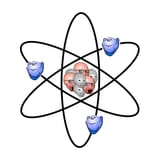Search Results
6/16/2025, 2:03:49 AM
I always thought that elements are radioactive because of the fact that the nucleus is too massive for all the protons/nautrons to be able to be binded together. And that's why it decays into lighter elements. And that logic works because basically every element after the first radioactive element is also radioactive. And it seems the bigger the atomic number, the more radioactive it is. Logic works and everything makes sense.
But then I discovered that there's this one bastard called technetium which has atomic number as low as 43 and yet that one is radioactive. Less than half of uranium for example. Why is that?
I saw an explanation on google which says that for some reason the nucleus is less stable for odd numbered elements and 43 is odd, that's why technetium is radioactive. But that logic falls flat on it's face because elements like yttrium, niobium, gold, etc, also have odd numbered atomic number but they're stable.
But then I discovered that there's this one bastard called technetium which has atomic number as low as 43 and yet that one is radioactive. Less than half of uranium for example. Why is that?
I saw an explanation on google which says that for some reason the nucleus is less stable for odd numbered elements and 43 is odd, that's why technetium is radioactive. But that logic falls flat on it's face because elements like yttrium, niobium, gold, etc, also have odd numbered atomic number but they're stable.
Page 1
